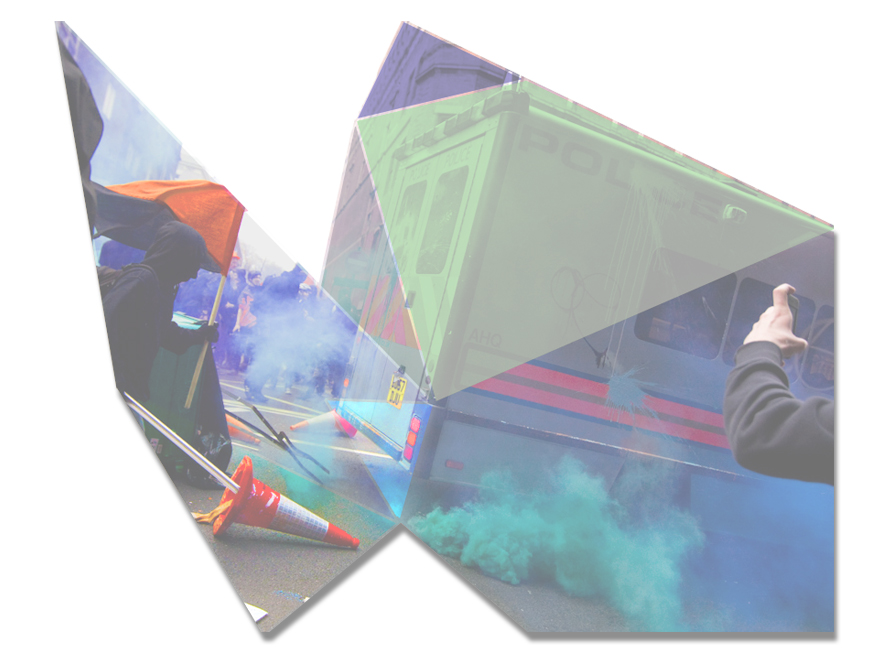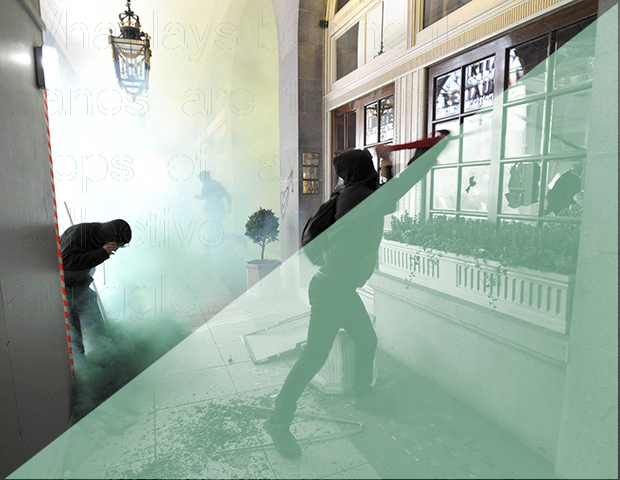Act 1, Scene 1:
Lights up:
We see a girl, any age, any race, wearing any clothes you can imagine.
She sits in a room. It’s your room, or my room, or a room of your childhood, or maybe future, in your imagination.
Yes, she is sitting though. Not standing. Sitting somehow. In my mind anyway. Maybe on a bed, maybe a chair… you decide.
She talks, slow and steady. Quietly at first… getting louder.
She has never said this before and now she starts:
“I am nothing like you think I am. The person behind that mask, the girl in black running through the streets of London, letting off flares, throwing paint bombs. I am a contradiction. I am nothing like you think I am.
Breathe: 10 seconds. Less if you want, more if needed.
And I see what happened on Saturday, I see myself as taking part in one big huge performance, a performance with consequences, each of us playing their part. My part is normally the trickster, the Joker, the fool. I occupy a space that is both fun and interesting, it’s exciting, I like it, I know it. I get there easily. It’s not really a performance, it’s mostly me.
On Saturday I performed in a completely different role, with a completely new and exciting set of performers each one taking their role probably more seriously than I. I had no problem; I have no problem with what I did. Me personally, I laid a boundary and I stuck to it. If anyone were to ask me what I did, and I knew that they weren’t going to arrest me….
She chuckles, as much to herself as you.
…I would tell them. I have no problem with what I did.
And yet and yet, we’re vilified. And we worry about this, as thinking, caring human beings. Individuals that all care probably too much. We’re vilified. The police are not vilified, we’re vilified. And is this a problem? Do we care; should we care? Does this mean our tactic was wrong and we should change it? I’m not sure.
If every piece of theatre needs an antagonist, were we that antagonist? If so, is the protagonist the State? In which case, that’s sad… do I want to flip that and turn the state into the antagonist and me the protagonist? I don’t know. Perhaps that’s a position I’ve always had and now pushed and pushed and marginalised further and further, to a new and interesting, weird space, that I find myself in I must face the realisation that I am the antagonist and be happy with that position and Ok with that position and if I’m not happy with that position reassess, reclaim, change it up, make something new.
If I am directing this play…. It might be different. If I choreographed the moves, set all the places, designed all the costumes and got all the sets it might be a different play. But I haven’t. I am not that person. No one single individual can and will ever be that person, and nor should they be. Nor should they be. The strength of this thing, whatever it may be, is its diverse directors, its autonomous individuals pushing their own agenda forward. Standing up to say “No”. To say “I don’t like this.”
It’s empowering and we should not be embarrassed or apologise for the things that happened on Saturday. This was a part we played and maybe the only thing we should apologise for is a naiveté that we entered into that situation with, a thought that somehow we weren’t playing the antagonist, that somehow we were trying to, I don’t know, I don’t know what else we could have been really, realistically. We certainly weren’t the Joker; we certainly weren’t the shadow that creeps in everything. We were the antagonist and designed to shake things up, to be a visible voice saying “No” loudly and really fucking proudly. You know, why wear the mask, why not wear the mask? Whatever…. These are irrelevant questions. Black again…
Pause, again, you decide for how long
Yes, it’s definitely a sign of antagonism for me. It about saying I’m pissed off and quite rightly so and not being ashamed of that anger and that rage and that sorrow and capitulating and not accepting in my heart that its the way life has to be, with no real autonomous power cos I think we do have power. And if we are helpless, then I want none of it! And I reject it! Je refuse! I refuse.”
Fade back to black:
Act 1, Sc 2:
It’s still black.
The characters are there in your memory, as are the sets, the costumes. Design them how you want them to look, let the characters say the words you want to say.
Don’t be afraid.

